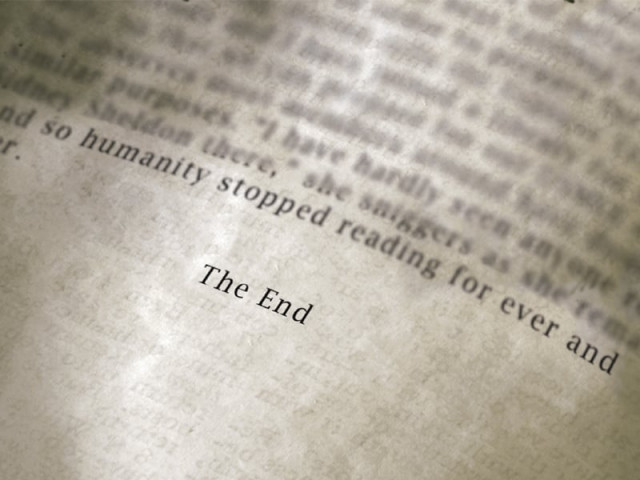Books calling 15: ‘SOS’!
Reading for pleasure continues to decline, not because of a lack of books, but a lack of readers.

Deep in the throes of Saddar one afternoon, in a bustling bazaar full of electronic items, cell phones and local dhaabas sits an old baba jee around a conspicuous corner with a rare commodity on sale - books!
The stall is nothing more lavish than a 4x4 space covered with a plain sheet, with books scattered all over it. A closer look reveals that this baba sells some famous works, by the likes of Ismat Chugtai, Qudratullah Shahab, Leo Tolstoy, Gabrial Garcia Marquiz and many more. A little area on the side of the stall is studded with newspapers and magazines and other publications that seem to have found their home on this literary corner.
Despite the literary gems studding this unlikely corner, the stall doesn’t get many visitors. The ‘used’ mobile store across the road manages to pull a bigger crowd.
This state of affairs isn’t unique to this quaint little corner shop - even big, flashy book stores across the city don’t fare much better.
It wouldn’t be an exaggeration to say that the culture of reading is dying slowly and gradually. Iqbal Sualeh Muhammad, owner of Paramount Publishing Enterprise, blames it on misplaced priorities. “Children follow their parents in terms of habits. If our priorities are branded clothes rather than books, then a dying trend in reading shouldn’t come as a surprise.”
Concurring with Muhammad is Qadir Gadit, General Manager at Paramount Publishers, who says: “There was a time when the once-famous Elphinstone street (now called Zaibunnisa Street) alone housed a dozen book stores… none remains today. They have all been replaced by cloth and shoe shops now.”
Closing doors to opinions, voices, people, places, and knowledge at large; the nation is finally paying a price for letting books sit on the shelf. Now here we sit waiting for an intellectual redemption that doesn’t seem anywhere near us.
When people do buy books, they seem to be most interested in low-priced pirated texts. When one walks through the narrow zig-zags of the popular Urdu Bazaar, you notice that the streets are busy with people looking at books.
Most visitors here, however, are hunting for nominally priced course books for the new academic year. The genuine book lover is still missing from the scene.
There is a lot of talk about town when it comes to pirated movies and music but for books people have their own justifications. “I love reading books but can’t afford to spend a lot of money on my habit. I don’t see what’s wrong with buying a pirated book if I can buy it in less than half the price,” says Ikram, an avid reader.
True book lovers, who have with a book what may well be regarded as a romantic liaison, are few and far in between. For these people, buying and reading a book is a sacred experience and they aren’t bogged down by trivialities like price tags. “I am ready to make a sacrifice for a good book,” says Ahsan who despite earning an average salary likes to maintain a personal collection of books.
One is forced to think - if the only thing keeping people away from picking up a book is the price on the back flap, then why hasn’t anyone intervened?
Promoting local publishers and authors could be a start, just as it has been done in India. But as Mohsin, Senior Manager at one of the Liberty Books stores points out: “The reality remains this: we are not even half as big a market as India along with the fact that Indian publishers have infrastructural support from stake holders such as subsidised paper for printing books with; among other things.”
“India, however, is an example beyond our reach just as are many other publishing houses across the globe that are trillions of miles ahead… one established factor for which is how they have prioritised education over other fields,” remarks Muhammad, of Paramount Publishers.
He candidly recalls an incident with an education minister who was requested for his comments at an international book fair some years ago. “The minister insisted that someone else write the comments on his behalf and he’d sign the space underneath.”
Despite downsizing on the shelves and peanuts worth of profit (in comparison with other burgeoning enterprises) there still seems to exist a silver lining. It’s not a downward spiral all throughout. “Reading shall be the destiny of this nation!” says Mohsin. “It may start with a certain class who can afford it but it will grow.” Even Gadit sees hope when he finds visitors from all areas of the city at book fairs. “I am most pleased when I see young parents encouraging their children to buy books.”
Parents may have started doing this in an attempt to make up for lost time – they may have realized that we have practically lost a generation to computers and are on the verge of losing another to mobile phones and texting. Obviously, in a culture where you can send a thousand text messages for less than five rupees, a book worth Rs500 will seem excessive.
Libraries that may have served as help are either worn out or ill equipped or at best cater to students who mostly visit them to prepare for their exams. Amna, a young doctor tells The Express Tribune, “My friends and I have joined a library for two months only, so that we can prepare for the United States Medical Licensing Examination (USMLE).” She observes most members around have done so for similar purposes. “I have hardly seen anyone reading Sidney Sheldon there,” she sniggers as she remarks.
Large scale investments have been made for promoting everything from mobile phones to video games. Similar interventions might be handy in bringing the book back into our hands. However Muhammad speculates, “With poverty, economic instability and political chaos nibbling away at the society, expecting people to nurture intellect would be a far cry.”
While a genuine book lover or two still exist in scanty patches keeping hope alive for fancy book stores as well as ascetic stalls in open grounds alike, we are still miles away from becoming a society that reads.
Published in The Express Tribune, April 30th, 2011.



















COMMENTS
Comments are moderated and generally will be posted if they are on-topic and not abusive.
For more information, please see our Comments FAQ